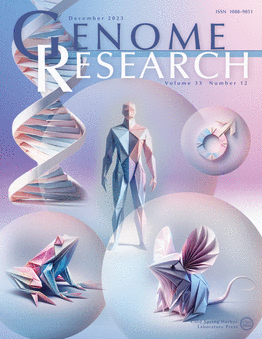利用短读测序数据对选择的种系适应性免疫系统位点进行基因分型
IF 5.5
2区 生物学
Q1 BIOCHEMISTRY & MOLECULAR BIOLOGY
引用次数: 0
摘要
随着我们进入个性化医疗的时代,医疗保健越来越注重根据患者的遗传和环境情况定制诊断和治疗。一个人的生理构成的一个关键组成部分是他们的免疫系统,但许多免疫系统基因的个体遗传变异仍然无法使用经典的全基因组或靶向测序方法进行分析。特别是,种系适应性免疫系统基因,如免疫球蛋白(IG)和T细胞受体(TR)基因,由于其高度重复和同源性,特别难以使用经典的基于参考的方法进行基因分型。在本文中,我们提出了一个新的计算工具包ImmunoTyper2,用于对IG lambda和kappa的可变基因进行基因分型,以及使用短读全基因组序列数据的TR位点,使用整数线性规划公式,作为对只关注IGHV区域的immunotype - sr套件的更新。我们使用孟德尔一致性分析对来自1000基因组计划的590个三人组进行基因分型性能评估,将40个样本与HPRC组装衍生的基因型进行基准比较,并通过测序深度分析和参数敏感性测试评估其稳健性。我们引入了等位基因调用置信度度量来帮助量化可靠性。我们还进行了一项前瞻性疾病关联研究,将immunotype2应用于来自COVNET联盟的461名COVID-19患者队列的WGS数据集,以展示如何将其应用于研究疾病的遗传关联。本文章由计算机程序翻译,如有差异,请以英文原文为准。
Genotyping of selected germline adaptive immune system loci using short-read sequencing data
As we enter the age of personalized medicine, healthcare is increasingly focused on tailoring diagnoses and treatments based on patients’ genetic and environmental circumstances. A critical component of a person's physiological makeup is their immune system, but individual genetic variation in many immune system genes has remained resistant to analysis using classical whole-genome or targeted sequencing approaches. In particular, germline adaptive immune system genes, like immunoglobulin (IG) and T cell receptor (TR) genes, are particularly hard to genotype using classic reference-based methods owing to their highly repetitive and homologous nature. In this paper, we present ImmunoTyper2, a new computational toolkit for genotyping the variable genes of the IG lambda and kappa, and the TR loci with short-read whole genome sequence data, using an integer linear programming formulation, as an update to the ImmunoTyper-SR suite, which focused on IGHV region only. We evaluate its genotyping performance using Mendelian concordance analysis in 590 trios from the 1000 Genomes Project, benchmarking 40 samples against HPRC assembly-derived genotypes, and assessing robustness through sequencing depth analysis and parameter sensitivity tests. We introduce allele call confidence metrics to help quantify reliability. We also perform a prospective disease association study, applying ImmunoTyper2 to a WGS data set from a cohort of 461 COVID-19 patients from the COVNET Consortium to demonstrate how it can be applied to investigate genetic associations with disease.
求助全文
通过发布文献求助,成功后即可免费获取论文全文。
去求助
来源期刊

Genome research
生物-生化与分子生物学
CiteScore
12.40
自引率
1.40%
发文量
140
审稿时长
6 months
期刊介绍:
Launched in 1995, Genome Research is an international, continuously published, peer-reviewed journal that focuses on research that provides novel insights into the genome biology of all organisms, including advances in genomic medicine.
Among the topics considered by the journal are genome structure and function, comparative genomics, molecular evolution, genome-scale quantitative and population genetics, proteomics, epigenomics, and systems biology. The journal also features exciting gene discoveries and reports of cutting-edge computational biology and high-throughput methodologies.
New data in these areas are published as research papers, or methods and resource reports that provide novel information on technologies or tools that will be of interest to a broad readership. Complete data sets are presented electronically on the journal''s web site where appropriate. The journal also provides Reviews, Perspectives, and Insight/Outlook articles, which present commentary on the latest advances published both here and elsewhere, placing such progress in its broader biological context.
 求助内容:
求助内容: 应助结果提醒方式:
应助结果提醒方式:


